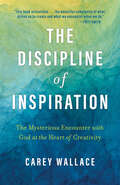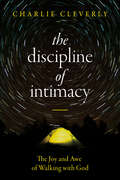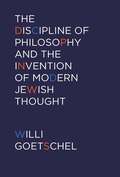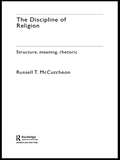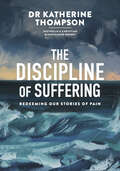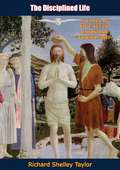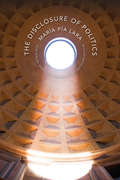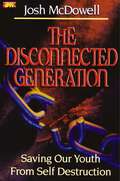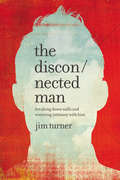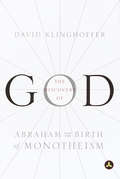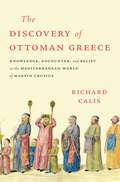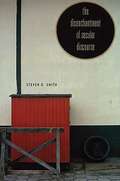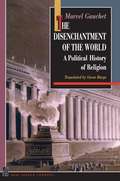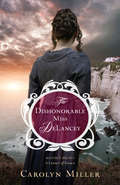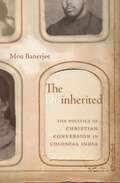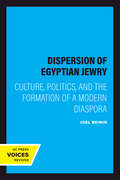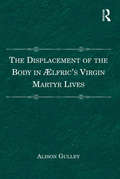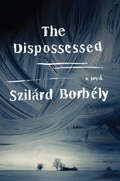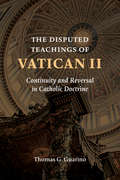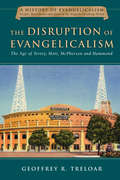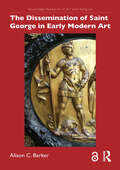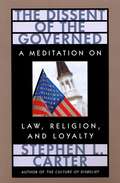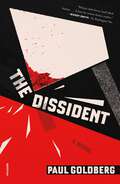- Table View
- List View
The Discipline of Inspiration: The Mysterious Encounter with God at the Heart of Creativity
by Carey WallaceLearn where inspiration comes from and how to harness it in your life and work. We all know the sensation of inspiration. It&’s what tells a painter what to paint and a singer how to sing—and what prompts us to throw a new spice into an old recipe. But what is inspiration? When we train artists, we typically identify them by their talent and train them in technique. We talk very little about the crucial creative spark of inspiration. Where does it come from? What does it want from us? How can we get more of it? In The Discipline of Inspiration, Carey Wallace meditates on this vital spark and on the ways artists have negotiated with it across genres and throughout history. She also offers practical methods—including silence, community, and rest—to help everyone access more inspiration, more often. Artists will develop a fresh perspective on inspiration and learn new tools for their creative practice. And readers from all walks of life will discover the transformative power of inspiration in every aspect of their lives.
The Discipline of Intimacy: The Joy and Awe of Walking with God
by Charlie CleverlyPeople who pray are those who break through, who hold on, who stand in the gap, who will not be silent and even who change history. But they are also those who wait in the silence, sometimes in the sorrows—who ‘stand in the council of the Lord’, who contemplate his beauty and stand in awe. We need both! This book looks at the dynamic paradox of prayer: knowing how to be still and silent but also how to plead and speak. Knowing how to let go but also how to hold on. Charlie Cleverly calls this ‘the Discipline of Intimacy’. Learning this can be to learn to love God, walk with him, be changed in yourself and even—as we see for so many moving examples in this book—help change the world. Includes questions for small groups and personal reflection. Watch the accompanying videos at www.disciplineofintimacy.com.
The Discipline of Philosophy and the Invention of Modern Jewish Thought
by Willi GoetschelExploring the subject of Jewish philosophy as a controversial construction site of the project of modernity, this book examines the implications of the different and often conflicting notions that drive the debate on the question of what Jewish philosophy is or could be.The idea of Jewish philosophy begs the question of philosophy as such. But “Jewish philosophy” does not just reflect what “philosophy” lacks. Rather, it challenges the project of philosophy itself.Examining the thought of Spinoza, Moses Mendelssohn, Heinrich Heine, Hermann Cohen Franz Rosenzweig, Martin Buber, Margarete Susman, Hermann Levin Goldschmidt, and others, the book highlights how the most philosophic moments of their works are those in which specific concerns of their “Jewish questions” inform the rethinking of philosophy’s disciplinarity in principal terms.The long overdue recognition of the modernity that informs the critical trajectories of Jewish philosophers from Spinoza and Mendelssohn to the present emancipates not just “Jewish philosophy” from an infelicitous pigeonhole these philosophers so pointedly sought to reject but, more important, emancipates philosophy from its false claims to universalism.
The Discipline of Religion: Structure, Meaning, Rhetoric
by Russell T. McCutcheonThe Discipline of Religion is a lively critical journey through religious studies today, looking at its recent growth as an academic discipline, and its contemporary political and social meanings. Focusing on the differences between religious belief and academic religious discourse, Russell T. McCutcheon argues that the invention of religion as a discipline blurs the distinction between criticism and doctrine in its assertion of the relevance of faith as a credible object of study. In the leap from disciplinary criticism to avowal of actual cosmic and moral meaning, schools of religious studies extend their powers far beyond universities and into the everyday lives of those outside, managing and curtailing specific types of speech and dissent.
The Discipline of Suffering: Redeeming Our Stories of Pain
by Katherine ThompsonFrom the author of the bestseller Christ-Centred Mindfulness, a transformative book that tackles the faulty stories we tell ourselves during times of pain and suffering.Katherine Thompson shows how suffering can be a spiritual discipline, fostering growth, healing and a deeper faith in God. Her book provides a safe space to explore the difficult questions raised by suffering while encouraging us to confront personal challenges rather than avoid them.The Discipline of Suffering offers practical strategies, real-life stories and useful skills to help reconstruct broken lives, equipping readers to navigate through difficult times.Whether you seek healing, resilience or a renewed sense of purpose, The Discipline of Suffering is your guide to redeeming your story and finding meaning amidst adversity.
The Disciplined Life: Studies in Fine Art of Christian Discipleship
by Richard Shelley TaylorThe plight of modern man may be summed up in his striving for the road of self-indulgence. The way of least resistance is his goal.With bold, deft strokes from his ready pen, Dr. Richard S. Taylor penetrates the shallowness of our culture and lays bare the dire need for disciplined living.He touches on all those areas which stymie saints. Overeating, moodiness, erratic emotions, punctuality—all get their proper attention.But, best of all, he offers a program on how to actually become a disciplined person!If you are tired of the sloppiness and low productivity level of your personal life, wade in! This is the book for you!
The Disclosure of Politics
by Maria Pia LaraMaría Pía Lara explores the ambiguity of secularization and the theoretical potential of a structural break between politics and religion. For Lara, secularization means the translation of religious semantics into politics; a transformation of religious notions into political ideas; and the reoccupation of a space left void by changing political actors, one that gives rise to new conceptions of political interaction. Conceptual innovation redefines politics as a horizontal relationship between governments and the governed, better enabling societies (and political actors) to articulate meaning through action.
The Disclosure of Politics: Struggles Over the Semantics of Secularization (New Directions in Critical Theory #35)
by Maria LaraPostmodern political critiques speak of the death of ideology, the end of history, and the postsecular return of religious attitudes, yet radical conservative theorists such as Mark Lilla argue religion and politics are inextricably intertwined. Returning much-needed uncertainty to debates over the political while revitalizing the very terms in which they are defined, María Pía Lara explores the ambiguity of secularization and the theoretical potential of a structural break between politics and religion.For Lara, secularization means three things: the translation of religious semantics into politics; a transformation of religious notions into political ideas; and the reoccupation of a space left void by changing political actors that gives rise to new conceptions of political interaction. Conceptual innovation redefines politics as a horizontal relationship between governments and the governed and better enables societies (and individual political actors) to articulate meaning through action—that is, through the emergence of new concepts. These actions, Lara proves, radically transform our understanding of politics and the role of political agents and are further enhanced by challenging the structural dependence of politics on religious phenomena.
The Disconnected Generation
by Josh McdowellThe real battle is not in the amoral and immoral influences of our culture, but in the hearts of our young people, says author and speaker Josh McDowell inThe Disconnected Generation. And our young people are losing hope because they feel isolated and alienated from their parents. They are the disconnected generation. This book shows parents and youth workers how to understand and close the isolation gap to form nurturing, enduring relationships that can withstand cultural influences. As a companion toThe Disconnected Generation,the video curriculum resources provides five video sessions from Josh McDowell offering practical steps that every adult can take to close the emotional gap between themselves and their children.
The Disconnected Man: Breaking Down Walls and Restoring Intimacy with Him
by Jim TurnerTHE DISCONNECTED MAN tracks the journey of one man's surprise discovery of his own disconnectedness and his desire to help other men, and the women who love them, before it is too late. Disconnected men hide out in plain view: in our churches, in our families and in our communities. They are competent, capable men who quietly 'do their duty' and attract little attention. They are fairly happy guys, relatively unemotional and capable of carrying heavy loads of responsibility, but are very difficult to get to know beyond superficial friendship. A closer examination inside their marriages reveals a desert strewn with emotionally emaciated spouses. While their competence may build the church, organize a group, or run a company, they haven't the slightest notion how to connect intimately with those they love. Their wives suffer, usually in silence, while the church and culture press past this couple secretly falling apart. Jim Turner was that disconnected man going about his life, happily fulfilling his duty within his own self-protective bubble, until God suddenly burst it in a most horrific way. His story starts when that devastation left him clinging precariously to the remaining shreds of his broken marriage. Jim longs to share with other disconnected men what he learned through that ordeal, to help them understand their disobedience and show how they can achieve real connection with those they love.
The Discovery of God
by David KlinghofferFifty-three percent of the world’s population practices Judaism, Christianity, and Islam, religions that all trace their lineage to the towering, quasi-mythological figure of Abraham. In this reverent biography of the man who invented–or discovered–God, David Klinghoffer disentangles history from myth and uncovers the profound impact of Abraham’s message on his time and on the development of the modern world. The Discovery of Godchronicles Abraham’s life from his birth in Mesopotamia through his travels as preacher and missionary throughout the Middle East. Many of the primary sites of Abraham’s life and career still exist, and Klinghoffer describes what they were like in ancient times and how they appear today. The tangible details of the polytheistic culture are re-created, showing how Abraham challenged the most basic beliefs of his contemporaries. He did not set out to establish the Jewish religion, but rather to spread the message of ethical monotheism as it was revealed to him–a powerful message that deepened over time, as did his faith and relationship with God. In contrast to many scholars who, troubled by its contradictions and apparent errors, see the Bible as the work of a series of scribes and editors, Klinghoffer argues that the Bible should be viewed as an esoteric text that an only be comprehended in light of the oral tradition from which it emanated. Combining rigorous scholarship and interpretive ingenuity, he draws on biblical commentary and the Jewish oral tradition as preserved by sages from the Talmudic scholars to Maimonidies to explore and explain the miraculous origins of monotheism. At a time when the world seems to moving toward a renewed confrontation between the three great Abrahamic faiths,The Discovery of Godis a potent reminder of the history and beliefs that unite them.
The Discovery of Ottoman Greece: Knowledge, Encounter, and Belief in the Mediterranean World of Martin Crusius (Harvard Historical Studies #195)
by Richard CalisThe surprising story of the sixteenth-century Lutheran scholar who became Europe’s foremost authority on Ottoman Greece, shedding new light on the place of Greek culture and religion in the Western imagination.In the late sixteenth century, a German Lutheran scholar named Martin Crusius compiled an exceptionally rich record of Greek life under Ottoman rule. Although he never left his home in the university town of Tübingen, Crusius spent decades annotating books and manuscripts, corresponding with the Greek Orthodox Patriarch, and interviewing Greek Orthodox alms-seekers. Ultimately, he gathered his research into a seminal work called the Turcograecia, which served for centuries as Europe’s foremost source on Ottoman Greece. Yet as Richard Calis reveals, Crusius’s massive—and largely untapped—archive has much more to tell us about how early modern Europeans negotiated cultural and religious difference.In particular, Crusius’s work illuminates Western European views of the religious “other” within Christianity: the Greek Orthodox Christians living under Ottoman rule, a group both familiar and foreign. Many Western Europeans, including Crusius, developed narratives of Greek cultural and religious decline under Ottoman rule. Crusius’s records, however, reveal in exceptional detail how such stories developed. His interactions with his Greek Orthodox visitors, and with a vast network of correspondents, show that Greeks’ own narratives of hardship entwined in complex ways with Western Europeans’ orientalist views of the Ottoman world. They also reflect the religious tensions that undergirded these exchanges, fueled by Crusius’s fervent desire to spread Lutheran belief across Ottoman Greece and the wider world.A lively intellectual history drawn from a forgotten archive, The Discovery of Ottoman Greece is also a perceptive character study, in which Crusius takes his place in the history of ethnography, Lutheran reform, and European philhellenism.
The Disenchantment Of Secular Discourse
by Steven D. SmithProminent observers complain that public discourse in America is shallow and unedifying. This debased condition is often attributed to, among other things, the resurgence of religion in public life. Steven Smith argues that this diagnosis has the matter backwards: it is not primarily religion but rather the strictures of secular rationalism that have drained our modern discourse of force and authenticity.
The Disenchantment of the World: A Political History of Religion
by Marcel GauchetMarcel Gauchet has launched one of the most ambitious and controversial works of speculative history recently to appear, based on the contention that Christianity is "the religion of the end of religion." In The Disenchantment of the World, Gauchet reinterprets the development of the modern west, with all its political and psychological complexities, in terms of mankind's changing relation to religion. He views Western history as a movement away from religious society, beginning with prophetic Judaism, gaining tremendous momentum in Christianity, and eventually leading to the rise of the political state. Gauchet's view that monotheistic religion itself was a form of social revolution is rich with implications for readers in fields across the humanities and social sciences.Life in religious society, Gauchet reminds us, involves a very different way of being than we know in our secular age: we must imagine prehistoric times where ever-present gods controlled every aspect of daily reality, and where ancestor worship grounded life's meaning in a far-off past. As prophecy-oriented religions shaped the concept of a single omnipotent God, one removed from the world and yet potentially knowable through prayer and reflection, human beings became increasingly free. Gauchet's paradoxical argument is that the development of human political and psychological autonomy must be understood against the backdrop of this double movement in religious consciousness--the growth of divine power and its increasing distance from human activity.In a fitting tribute to this passionate and brilliantly argued book, Charles Taylor offers an equally provocative foreword. Offering interpretations of key concepts proposed by Gauchet, Taylor also explores an important question: Does religion have a place in the future of Western society? The book does not close the door on religion but rather invites us to explore its socially constructive powers, which continue to shape Western politics and conceptions of the state.
The Dishonorable Miss DeLancey (Regency Brides #3)
by Carolyn MillerWill a damaged reputation and desire for society's approval thwart the legacy of grace?Tainted by scandal and forced to leave London for the quieter Brighton countryside, the Honorable Miss Clara DeLancey is a shadow of her former society self. She's lost the man she loved to another and, in a culture that has no patience for self-pity, is struggling with depression. A chance encounter brings her a healing friendship with the sisters of an injured naval captain. But Clara's society mama is appalled at the new company she's keeping.Captain Benjamin Kemsley is not looking for a wife. But his gallant spirit won't let him ignore the penniless viscount's daughter--not when she so obviously needs assistance to keep moving forward from day to day. Can he protect his heart and still keep her safe?When they're pushed into the highest echelons of society at the Prince Regent's Brighton Pavilion, this mismatched couple must decide if family honor is more important than their hopes. Can they right the wrongs of the past and find future happiness together--without finances, family support, or royal favor?The Dishonorable Miss DeLancey is full of the captivating, flawed characters, fascinating historical details, and masterful writing that Carolyn Miller's fans have come to know in The Elusive Miss Ellison and The Captivating Lady Charlotte. If you love Lori Wick, Georgette Heyer, and other clean, wholesome Regency romance, you'll love this third book in the Regency Brides: A Legacy of Grace series.
The Disinherited: The Politics of Christian Conversion in Colonial India
by Mou BanerjeeAn illuminating history of religious and political controversy in nineteenth-century Bengal, where Protestant missionary activity spurred a Christian conversion “panic” that indelibly shaped the trajectory of Hindu and Muslim politics.In 1813, the British Crown adopted a policy officially permitting Protestant missionaries to evangelize among the empire’s Indian subjects. The ramifications proved enormous and long-lasting. While the number of conversions was small—Christian converts never represented more than 1.5 percent of India’s population during the nineteenth century—Bengal’s majority faith communities responded in ways that sharply politicized religious identity, leading to the permanent ejection of religious minorities from Indian ideals of nationhood.Mou Banerjee details what happened as Hindus and Muslims grew increasingly suspicious of converts, missionaries, and evangelically minded British authorities. Fearing that converts would subvert resistance to British imperialism, Hindu and Muslim critics used their influence to define the new Christians as a threatening “other” outside the bounds of authentic Indian selfhood. The meaning of conversion was passionately debated in the burgeoning sphere of print media, and individual converts were accused of betrayal and ostracized by their neighbors. Yet, Banerjee argues, the effects of the panic extended far beyond the lives of those who suffered directly. As Christian converts were erased from the Indian political community, that community itself was reconfigured as one consecrated in faith. While India’s emerging nationalist narratives would have been impossible in the absence of secular Enlightenment thought, the evolution of cohesive communal identity was also deeply entwined with suspicion toward religious minorities.Recovering the perspectives of Indian Christian converts as well as their detractors, The Disinherited is an eloquent account of religious marginalization that helps to explain the shape of Indian nationalist politics in today’s era of Hindu majoritarianism.
The Dispersion of Egyptian Jewry: Culture, Politics, and the Formation of a Modern Diaspora (Contraversions: Critical Studies in Jewish Literature, Culture, and Society #11)
by Joel BeininIn this provocative and wide-ranging history, Joel Beinin examines fundamental questions of ethnic identity by focusing on the Egyptian Jewish community since 1948. A complex and heterogeneous people, Egyptian Jews have become even more diverse as their diaspora continues to the present day. Central to Beinin's study is the question of how people handle multiple identities and loyalties that are dislocated and reformed by turbulent political and cultural processes. It is a question he grapples with himself, and his reflections on his experiences as an American Jew in Israel and Egypt offer a candid, personal perspective on the hazards of marginal identities.
The Displacement of the Body in Ælfric's Virgin Martyr Lives
by Alison GulleyThe Displacement of the Body in Ælfric's Virgin Martyr Lives addresses 10th-century Old English hagiographical translations, from Latin source material, by the abbot and grammarian Ælfric. The vitae of Agnes, Agatha, Lucy, and Eugenia, and the married saints Daria, Basilissa, and Cecilia, included in Ælfric's s Old English Lives of Saints, recount the lives, persecution, and martyrdom of young women who renounce sex and, in the first four stories, marriage, to devote their lives to Christian service. They purport to be about the primacy of virginity and the role of the body in attaining sanctity. However, a comparison of the Latin sources with Ælfric's versions suggests that his translation style, characterized by simplifying the most important meanings of the text, omits certain words or entire episodes that foreground suppressed female sexuality as key to sainthood. The Old English Lives de-emphasize the physical nature of faith and highlight the importance of spiritual purity. In this volume, Alison Gulley explores how the context of the Benedictine Reform in late Anglo-Saxon England and Ælfric's commitment to writing for a lay audience resulted in a set of stories depicting a spirituality distinct from physical intactness.
The Dispossessed: A Novel
by Szilard BorbelyA literary sensation on its original publication in Hungary, this hypnotic, hauntingly beautiful first novel from the acclaimed, award-winning poet and author Szilárd Borbély depicts the poverty and cruelty experienced by a partly-Jewish family in a rural village in the late 1960s and early 1970s."No one has ever written so beautifully and at the same time so without pity about the suffering in the isolated provincial villages of Hungary...His sentences have a surgical precision, and their sustained rhythm only reinforces the power of what they evoke."--Nicole Henneberg, Frankfurter Allgemeine ZeitungIn a tiny village in northeast Hungary, close to the Romanian border, a young, unnamed boy warily observes day-to-day life and chronicles his family's struggles to survive. Like most of the villagers, his family is desperately poor, but their situation is worse than most--they are ostracized because of his father's Jewish heritage and his mother's connections to the Kulaks, who once owned land and supported the fascist Horthy regime before it was toppled by Communists. With unflinching candor, the little boy's observations are related through a variety of narrative voices--crude diatribes from his alcoholic father, evocative and lyrical tales of the past from his grandparents, and his own simple yet potent prose. Together, these accounts reveal not only the history of his family but that of Hungary itself, through the physical and psychic traumas of two World Wars to the country's treatment of Jews, both past and present. Drawing heavily on Borbély's memories of his own childhood, The Dispossessed is an extraordinarily realistic novel. Raw and often brutal, yet glimmering with hope, it is the crowning achievement of an uncompromising talent.
The Disputed Teachings of Vatican II: Continuity and Reversal in Catholic Doctrine
by Thomas G. GuarinoThe Second Vatican Council (1962–1965) radically shook up many centuries of tradition in the Roman Catholic Church. This book by Thomas Guarino, a noted expert on the sources and methods of Catholic doctrine, investigates whether Vatican II&’s highly contested teachings on religious freedom, ecumenism, and the Virgin Mary represented a harmonious development of—or a rupture with—Catholic tradition.Guarino&’s careful explanations of such significant terms as continuity, discontinuity, analogy, reversal, reform, and development greatly enhance and clarify his discussion. No other book on Vatican II so clearly elucidates the essential theological principles for determining whether—and to what extent—a conciliar teaching is in continuity or discontinuity with antecedent tradition.Readers from all faith traditions who care about the logic of continuity and change in Christian teaching will benefit from this masterful case study.
The Disputed Teachings of Vatican II: Continuity and Reversal in Catholic Doctrine
by Thomas G. GuarinoThe Second Vatican Council (1962–1965) radically shook up many centuries of tradition in the Roman Catholic Church. This book by Thomas Guarino, a noted expert on the sources and methods of Catholic doctrine, investigates whether Vatican II&’s highly contested teachings on religious freedom, ecumenism, and the Virgin Mary represented a harmonious development of—or a rupture with—Catholic tradition.Guarino&’s careful explanations of such significant terms as continuity, discontinuity, analogy, reversal, reform, and development greatly enhance and clarify his discussion. No other book on Vatican II so clearly elucidates the essential theological principles for determining whether—and to what extent—a conciliar teaching is in continuity or discontinuity with antecedent tradition.Readers from all faith traditions who care about the logic of continuity and change in Christian teaching will benefit from this masterful case study.
The Disruption of Evangelicalism: The Age of Torrey, Mott, McPherson and Hammond (History of Evangelicalism Series #4)
by Geoffrey R. TreloarThe Disruption of EvangelicalismThe Disruption of Evangelicalism
The Dissemination of Saint George in Early Modern Art (Routledge Research in Art and Religion)
by Alison C. BarkerFocusing on England, the German-speaking territories and the Italian peninsula, this book examines how Saint George’s image crossed boundaries and was disseminated.Alison Barker attempts to "dissolve" the boundary of the Alps through examination of images of Saint George, the "travelling" saint. She argues that George’s status as chivalric hero and Christian martyr made him uniquely qualified to cross boundaries in this way, especially through the networks of courts and court culture. Her research demonstrates how the highly recognisable iconography of Saint George’s image meant something different, depending on where he was represented and who was looking at him. Through four case studies that examine how he was depicted and viewed across boundaries of space and media, this book charts a multi-layered cultural network, linking different artists and audiences from three regions. Each case study makes a claim about Saint George and how he acts and is used by four sections of society: rulers, artists, corporate groups and the broad masses.The book will be of interest to scholars working in art history, religious history and Renaissance studies.
The Dissent of the Governed: A Meditation on Law, Religion, and Loyalty (The William E. Massey Sr. Lectures in the History of American Civilization #9)
by Stephen L. CarterBetween loyalty and disobedience; between recognition of the law's authority and realization that the law is not always right: In America, this conflict is historic, with results as glorious as the mass protests of the civil rights movement and as inglorious as the armed violence of the militia movement. In an impassioned defense of dissent, Stephen L. Carter argues for the dialogue that negotiates this conflict and keeps democracy alive. His book portrays an America dying from a refusal to engage in such a dialogue, a polity where everybody speaks, but nobody listens. The Dissent of the Governed is an eloquent diagnosis of what ails the American body politic--the unwillingness of people in power to hear disagreement unless forced to--and a prescription for a new process of response. Carter examines the divided American political character on dissent, with special reference to religion, identifying it in unexpected places, with an eye toward amending it before it destroys our democracy. At the heart of this work is a rereading of the Declaration of Independence that puts dissent, not consent, at the center of the question of the legitimacy of democratic government. Carter warns that our liberal constitutional ethos--the tendency to assume that the nation must everywhere be morally the same--pressures citizens to be other than themselves when being themselves would lead to disobedience. This tendency, he argues, is particularly hard on religious citizens, whose notion of community may be quite different from that of the sovereign majority of citizens. His book makes a powerful case for the autonomy of communities--especially but not exclusively religious--into which democratic citizens organize themselves as a condition for dissent, dialogue, and independence. With reference to a number of cases, Carter shows how disobedience is sometimes necessary to the heartbeat of our democracy--and how the distinction between challenging accepted norms and challenging the sovereign itself, a distinction crucial to the Declaration of Independence, must be kept alive if Americans are to progress and prosper as a nation.
The Dissident: A Novel
by Paul Goldberg“A feast for serious fiction readers.” —Wendy Smith, The Washington Post“A dead-serious, dead-funny, no-he-didn't marvel.” —Joshua Cohen, author of The NetanyahusA thrilling, witty, and slyly original Cold War mystery about a ragtag group of Jewish refuseniks in Moscow.On his wedding day in 1976, Viktor Moroz stumbles upon a murder scene: two gay men, one of them a U.S. official, have been axed to death in Moscow. Viktor, a Jewish refusenik, is stuck in the Soviet Union because the government has denied his application to leave for Israel; he sits “in refusal” alongside his wife and their group of intellectuals, Jewish and not. But the KGB spots Viktor leaving the murder scene. Plucked off the street, he’s given a choice: find the murderer or become the suspect of convenience. His deadline is nine days later, when Henry Kissinger will be arriving in Moscow. Unsolved ax murders, it seems, aren’t good for politics.A whip-smart, often hilarious Cold War thriller, Paul Goldberg’s The Dissident explores what it means to survive in the face of impossible choices and monumental consequences. To help solve the case, Viktor ropes in his community, which includes his banned-text-distributing wife, a hard-drinking sculptor, a Russian priest of Jewish heritage, and a visiting American intent on reliving World War II heroics. As Viktor struggles to determine whom to trust, he’s forced to question not only the KGB’s murky motives but also those of his fellow refuseniks—and the man he admires above all: Kissinger himself.Immersive, unpredictable, and always ax-sharp, The Dissident is Cold War intrigue at its most inventive. It is an uncompromising look at sacrifice, community, and the scars of history and identity, from an expert storyteller.
